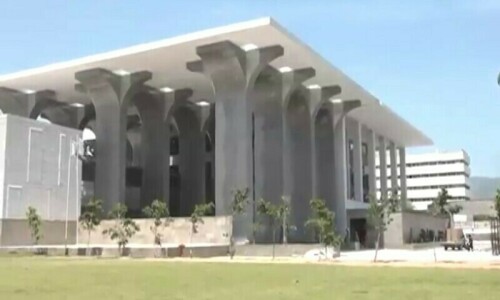WASHINGTON, Aug 27: The US State Department has said it cannot guarantee that former prime minister Benazir Bhutto would not be arrested if she returns to her country to contest the general elections scheduled for Oct 10.
The department also refused to join the chorus of criticism that has followed President Pervez Musharraf’s recent constitutional amendments aimed at concentrating most of the powers in his hands.
“We don’t pick particular candidates or support particular individuals, no,” the department’s spokesman Richard Boucher told a briefing in Washington on Monday when asked if the US government could ensure that she is not arrested.
Bhutto, who has been living in exile in London and Dubai since 1999, announced last week that she wanted to return home to contest elections.
She left Pakistan after another former prime minister, Nawaz Sharif, initiated corruption cases against her. The military government that toppled Sharif in October 1999 continued the proceedings against her.
The Musharraf government has announced that she would be arrested if she returned home, and that it would not allow Bhutto and Sharif, who was exiled to Saudi Arabia two years ago, to contest the elections because of their alleged corruption while in power. Both are looking for options to defy the ban.
Last week, Musharraf also announced controversial constitutional amendments that give him the power to dismiss the future parliament, sack an elected prime minister and head the National Security Council. He will also have the power to appoint armed forces chiefs.
Almost all opposition groups in Pakistan have rejected the changes as undemocratic and urged Musharraf to step down and allow a neutral caretaker government to hold the October elections.
Last week, the state department said Musharraf’s amendments would make it difficult to build democratic institutions in Pakistan but both the state department and the White House refused to criticize Musharraf for trying to amass power.
Later, President George W. Bush explained the reason for this when he described Musharraf as a key ally who was “tight with us” in the war against terrorism.
On Monday, the state department expressed hope that Musharraf would consider people’s comments while enacting the changes.
“These amendments have been out for public comment. And ... we look for them to be implemented in a way that’s consistent with that comment and with the Pakistani Constitution,” said Boucher.
“We’ve made quite clear the return to democratic civilian rule in Pakistan is important to us,” said the spokesman, adding: “It is something the Secretary (of State Colin Powell) discussed during his visit to Pakistan a month ago, something the deputy secretary (Richard Armitage) discussed with President Musharraf during his visit there. And we look to the elections in October to be a step in that direction.”
He said the United States “certainly wants to see a process of full restoration of democratic civilian rule to continue.
“But the bigger picture that remains important to us is the commitment that President Musharraf has made to return Pakistan to democratic civilian rule. That commitment remains important to us, as I’m sure it is to him as well.”












































